Natural Law and State Theory: Exploring Justice and Moral Dimensions
VerifiedAdded on 2022/09/12
|26
|6335
|22
Essay
AI Summary
This essay delves into the concept of natural law and its relationship with state theory, examining whether natural law is an essential component of moral theories of the state. It begins by defining natural law, emphasizing the innate human sense of justice and morality, and exploring its Christian concept. The essay discusses the views of various philosophers, including Plato, Aristotle, Cicero, Augustine, Aquinas, Luther, Locke, Hobbes, and Lamartine, on natural law. It contrasts natural law with legal positivism and highlights the purpose of law as ensuring justice. The essay then explores the application of natural law to state theory, arguing that a state's moral dimension is greatly influenced by natural law principles. It concludes that while natural law is intrinsic and essential, a system of distributive justice is also necessary for proper implementation and ensuring justice for all in society. The essay emphasizes the importance of morality and the understanding of right and wrong as foundational to both natural law and the moral character of the state.
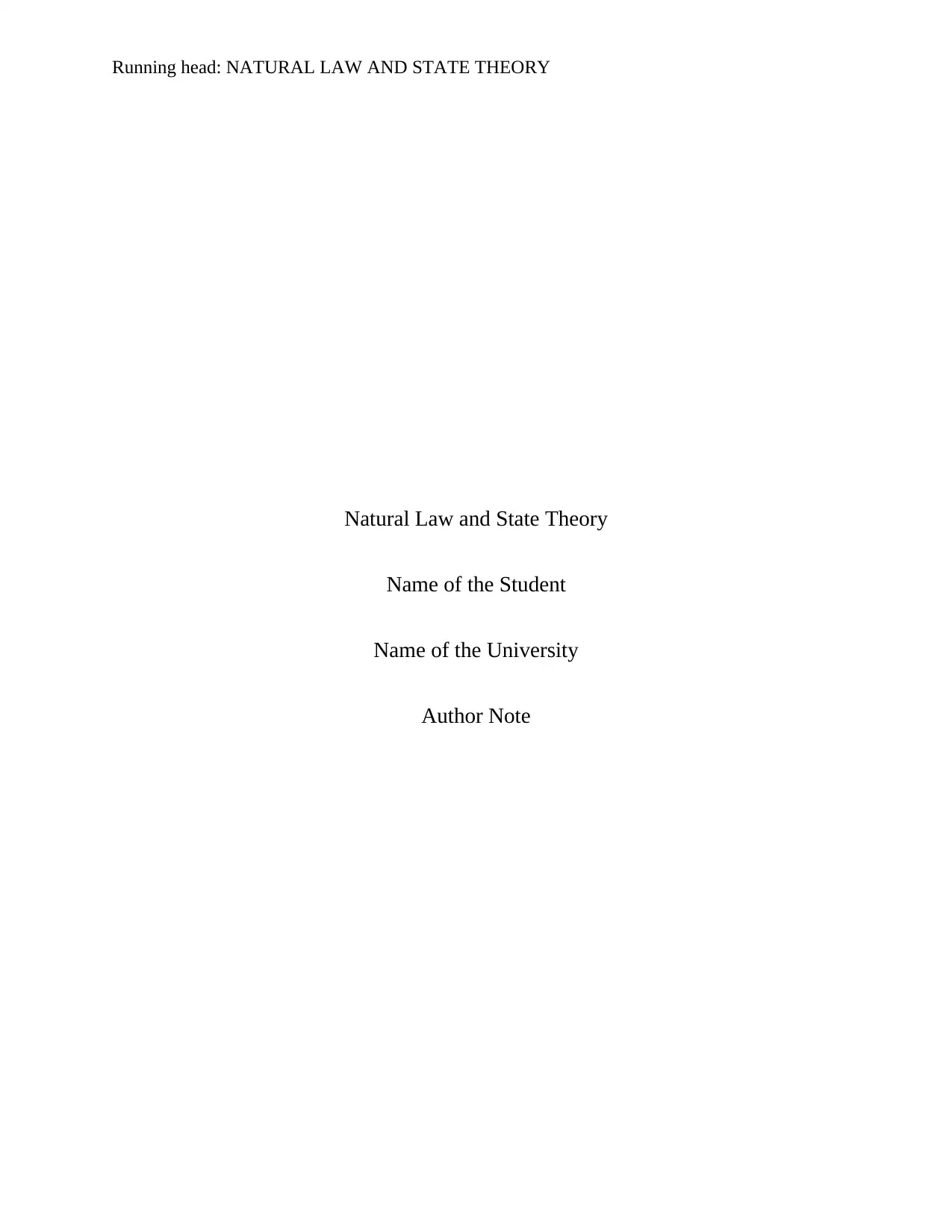
Running head: NATURAL LAW AND STATE THEORY
Natural Law and State Theory
Name of the Student
Name of the University
Author Note
Natural Law and State Theory
Name of the Student
Name of the University
Author Note
Paraphrase This Document
Need a fresh take? Get an instant paraphrase of this document with our AI Paraphraser
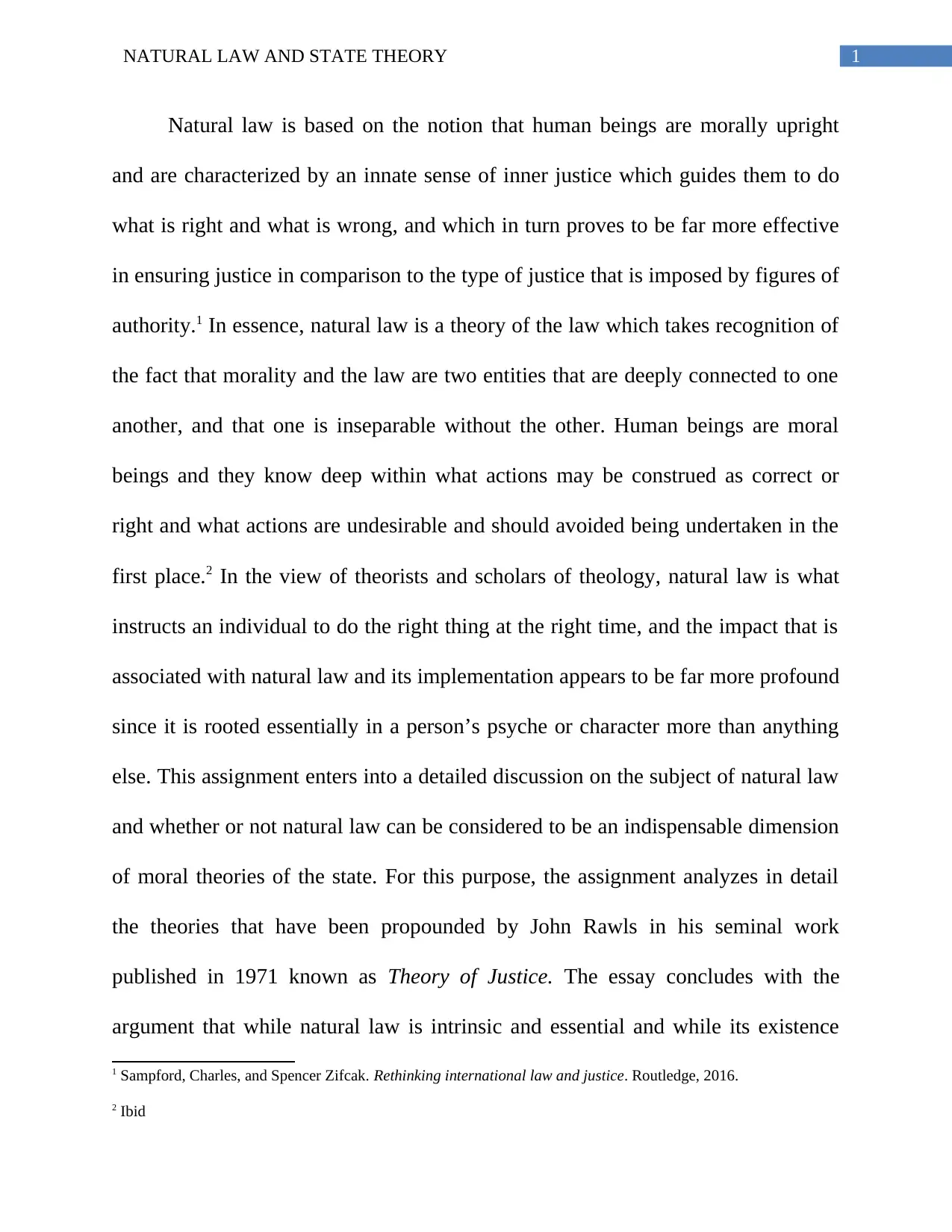
1NATURAL LAW AND STATE THEORY
Natural law is based on the notion that human beings are morally upright
and are characterized by an innate sense of inner justice which guides them to do
what is right and what is wrong, and which in turn proves to be far more effective
in ensuring justice in comparison to the type of justice that is imposed by figures of
authority.1 In essence, natural law is a theory of the law which takes recognition of
the fact that morality and the law are two entities that are deeply connected to one
another, and that one is inseparable without the other. Human beings are moral
beings and they know deep within what actions may be construed as correct or
right and what actions are undesirable and should avoided being undertaken in the
first place.2 In the view of theorists and scholars of theology, natural law is what
instructs an individual to do the right thing at the right time, and the impact that is
associated with natural law and its implementation appears to be far more profound
since it is rooted essentially in a person’s psyche or character more than anything
else. This assignment enters into a detailed discussion on the subject of natural law
and whether or not natural law can be considered to be an indispensable dimension
of moral theories of the state. For this purpose, the assignment analyzes in detail
the theories that have been propounded by John Rawls in his seminal work
published in 1971 known as Theory of Justice. The essay concludes with the
argument that while natural law is intrinsic and essential and while its existence
1 Sampford, Charles, and Spencer Zifcak. Rethinking international law and justice. Routledge, 2016.
2 Ibid
Natural law is based on the notion that human beings are morally upright
and are characterized by an innate sense of inner justice which guides them to do
what is right and what is wrong, and which in turn proves to be far more effective
in ensuring justice in comparison to the type of justice that is imposed by figures of
authority.1 In essence, natural law is a theory of the law which takes recognition of
the fact that morality and the law are two entities that are deeply connected to one
another, and that one is inseparable without the other. Human beings are moral
beings and they know deep within what actions may be construed as correct or
right and what actions are undesirable and should avoided being undertaken in the
first place.2 In the view of theorists and scholars of theology, natural law is what
instructs an individual to do the right thing at the right time, and the impact that is
associated with natural law and its implementation appears to be far more profound
since it is rooted essentially in a person’s psyche or character more than anything
else. This assignment enters into a detailed discussion on the subject of natural law
and whether or not natural law can be considered to be an indispensable dimension
of moral theories of the state. For this purpose, the assignment analyzes in detail
the theories that have been propounded by John Rawls in his seminal work
published in 1971 known as Theory of Justice. The essay concludes with the
argument that while natural law is intrinsic and essential and while its existence
1 Sampford, Charles, and Spencer Zifcak. Rethinking international law and justice. Routledge, 2016.
2 Ibid
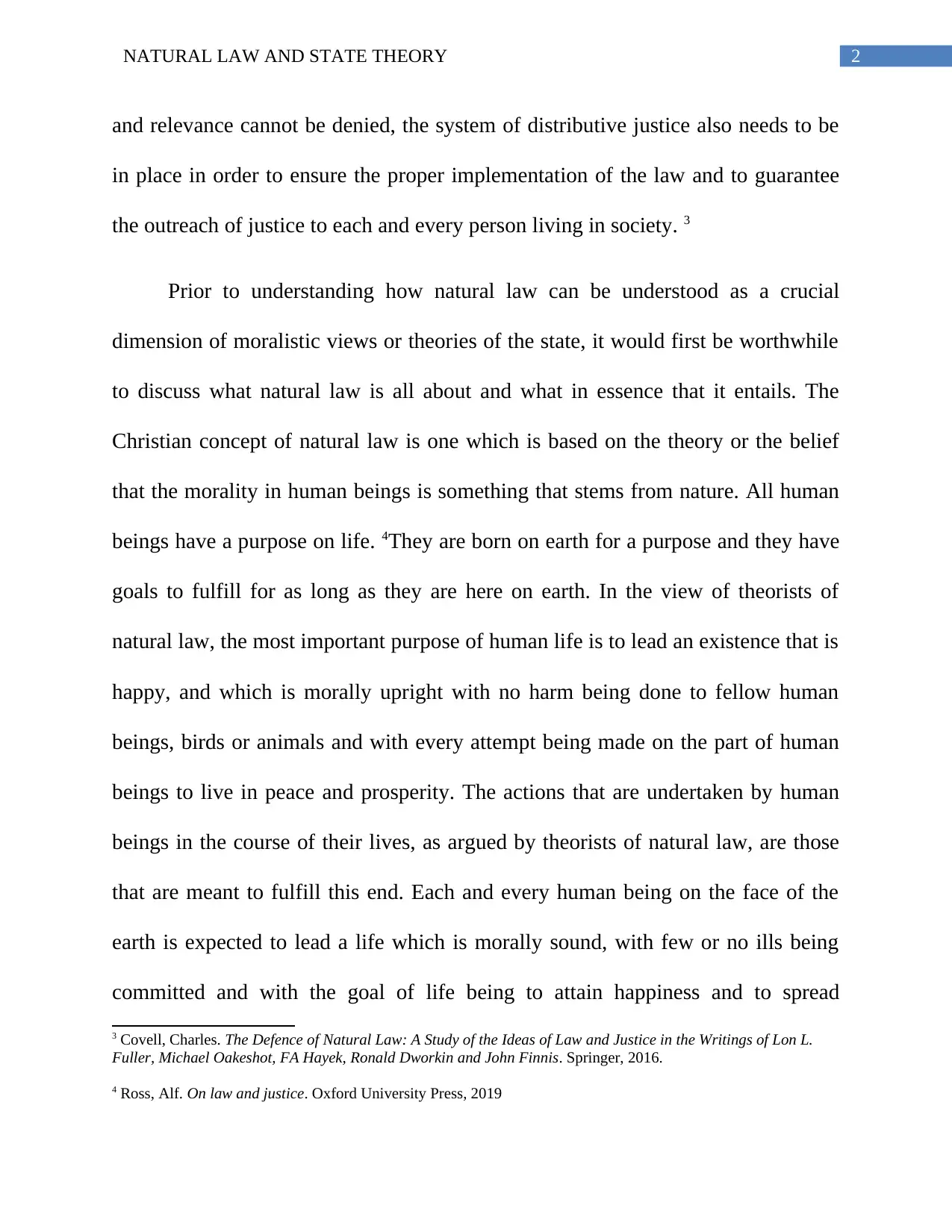
2NATURAL LAW AND STATE THEORY
and relevance cannot be denied, the system of distributive justice also needs to be
in place in order to ensure the proper implementation of the law and to guarantee
the outreach of justice to each and every person living in society. 3
Prior to understanding how natural law can be understood as a crucial
dimension of moralistic views or theories of the state, it would first be worthwhile
to discuss what natural law is all about and what in essence that it entails. The
Christian concept of natural law is one which is based on the theory or the belief
that the morality in human beings is something that stems from nature. All human
beings have a purpose on life. 4They are born on earth for a purpose and they have
goals to fulfill for as long as they are here on earth. In the view of theorists of
natural law, the most important purpose of human life is to lead an existence that is
happy, and which is morally upright with no harm being done to fellow human
beings, birds or animals and with every attempt being made on the part of human
beings to live in peace and prosperity. The actions that are undertaken by human
beings in the course of their lives, as argued by theorists of natural law, are those
that are meant to fulfill this end. Each and every human being on the face of the
earth is expected to lead a life which is morally sound, with few or no ills being
committed and with the goal of life being to attain happiness and to spread
3 Covell, Charles. The Defence of Natural Law: A Study of the Ideas of Law and Justice in the Writings of Lon L.
Fuller, Michael Oakeshot, FA Hayek, Ronald Dworkin and John Finnis. Springer, 2016.
4 Ross, Alf. On law and justice. Oxford University Press, 2019
and relevance cannot be denied, the system of distributive justice also needs to be
in place in order to ensure the proper implementation of the law and to guarantee
the outreach of justice to each and every person living in society. 3
Prior to understanding how natural law can be understood as a crucial
dimension of moralistic views or theories of the state, it would first be worthwhile
to discuss what natural law is all about and what in essence that it entails. The
Christian concept of natural law is one which is based on the theory or the belief
that the morality in human beings is something that stems from nature. All human
beings have a purpose on life. 4They are born on earth for a purpose and they have
goals to fulfill for as long as they are here on earth. In the view of theorists of
natural law, the most important purpose of human life is to lead an existence that is
happy, and which is morally upright with no harm being done to fellow human
beings, birds or animals and with every attempt being made on the part of human
beings to live in peace and prosperity. The actions that are undertaken by human
beings in the course of their lives, as argued by theorists of natural law, are those
that are meant to fulfill this end. Each and every human being on the face of the
earth is expected to lead a life which is morally sound, with few or no ills being
committed and with the goal of life being to attain happiness and to spread
3 Covell, Charles. The Defence of Natural Law: A Study of the Ideas of Law and Justice in the Writings of Lon L.
Fuller, Michael Oakeshot, FA Hayek, Ronald Dworkin and John Finnis. Springer, 2016.
4 Ross, Alf. On law and justice. Oxford University Press, 2019
⊘ This is a preview!⊘
Do you want full access?
Subscribe today to unlock all pages.

Trusted by 1+ million students worldwide
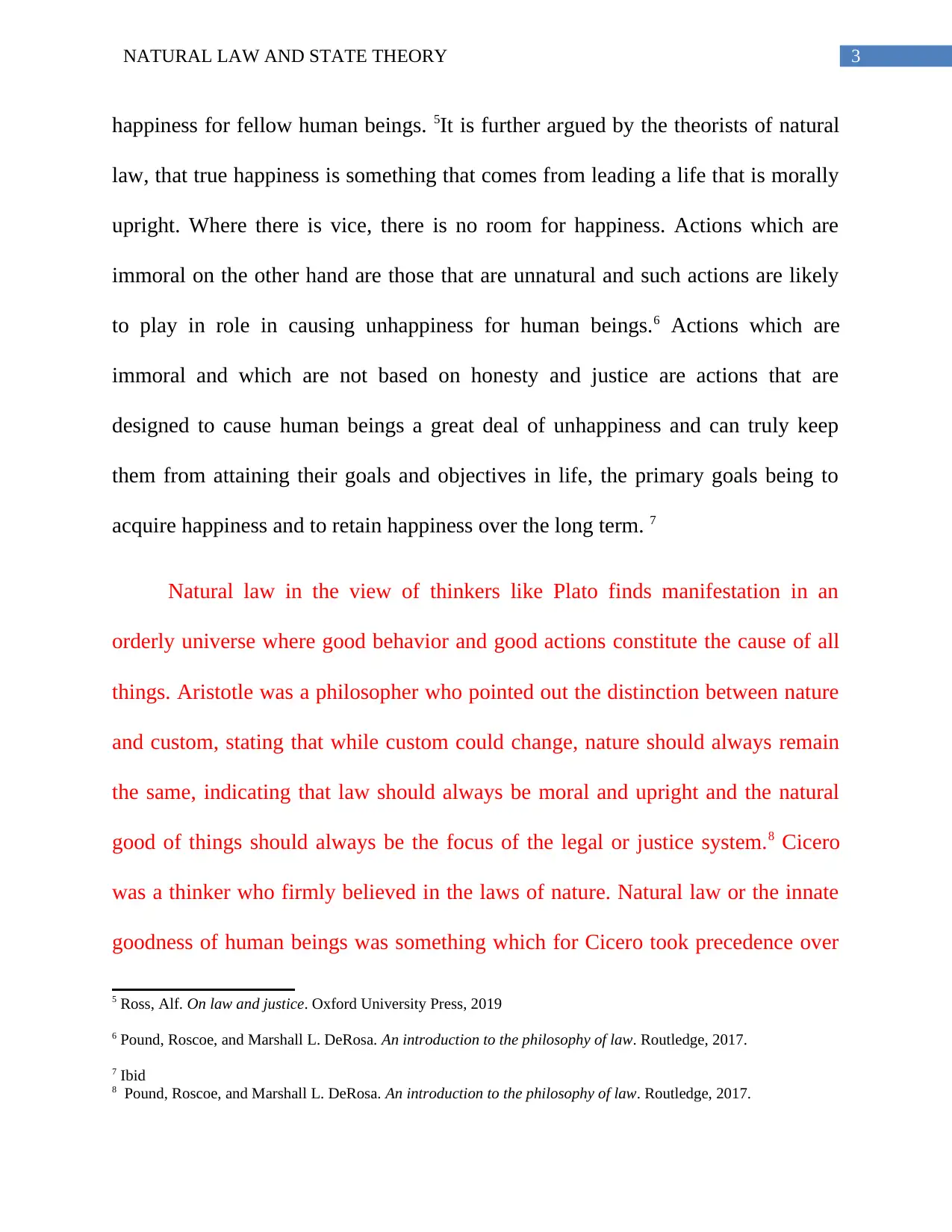
3NATURAL LAW AND STATE THEORY
happiness for fellow human beings. 5It is further argued by the theorists of natural
law, that true happiness is something that comes from leading a life that is morally
upright. Where there is vice, there is no room for happiness. Actions which are
immoral on the other hand are those that are unnatural and such actions are likely
to play in role in causing unhappiness for human beings.6 Actions which are
immoral and which are not based on honesty and justice are actions that are
designed to cause human beings a great deal of unhappiness and can truly keep
them from attaining their goals and objectives in life, the primary goals being to
acquire happiness and to retain happiness over the long term. 7
Natural law in the view of thinkers like Plato finds manifestation in an
orderly universe where good behavior and good actions constitute the cause of all
things. Aristotle was a philosopher who pointed out the distinction between nature
and custom, stating that while custom could change, nature should always remain
the same, indicating that law should always be moral and upright and the natural
good of things should always be the focus of the legal or justice system.8 Cicero
was a thinker who firmly believed in the laws of nature. Natural law or the innate
goodness of human beings was something which for Cicero took precedence over
5 Ross, Alf. On law and justice. Oxford University Press, 2019
6 Pound, Roscoe, and Marshall L. DeRosa. An introduction to the philosophy of law. Routledge, 2017.
7 Ibid
8 Pound, Roscoe, and Marshall L. DeRosa. An introduction to the philosophy of law. Routledge, 2017.
happiness for fellow human beings. 5It is further argued by the theorists of natural
law, that true happiness is something that comes from leading a life that is morally
upright. Where there is vice, there is no room for happiness. Actions which are
immoral on the other hand are those that are unnatural and such actions are likely
to play in role in causing unhappiness for human beings.6 Actions which are
immoral and which are not based on honesty and justice are actions that are
designed to cause human beings a great deal of unhappiness and can truly keep
them from attaining their goals and objectives in life, the primary goals being to
acquire happiness and to retain happiness over the long term. 7
Natural law in the view of thinkers like Plato finds manifestation in an
orderly universe where good behavior and good actions constitute the cause of all
things. Aristotle was a philosopher who pointed out the distinction between nature
and custom, stating that while custom could change, nature should always remain
the same, indicating that law should always be moral and upright and the natural
good of things should always be the focus of the legal or justice system.8 Cicero
was a thinker who firmly believed in the laws of nature. Natural law or the innate
goodness of human beings was something which for Cicero took precedence over
5 Ross, Alf. On law and justice. Oxford University Press, 2019
6 Pound, Roscoe, and Marshall L. DeRosa. An introduction to the philosophy of law. Routledge, 2017.
7 Ibid
8 Pound, Roscoe, and Marshall L. DeRosa. An introduction to the philosophy of law. Routledge, 2017.
Paraphrase This Document
Need a fresh take? Get an instant paraphrase of this document with our AI Paraphraser
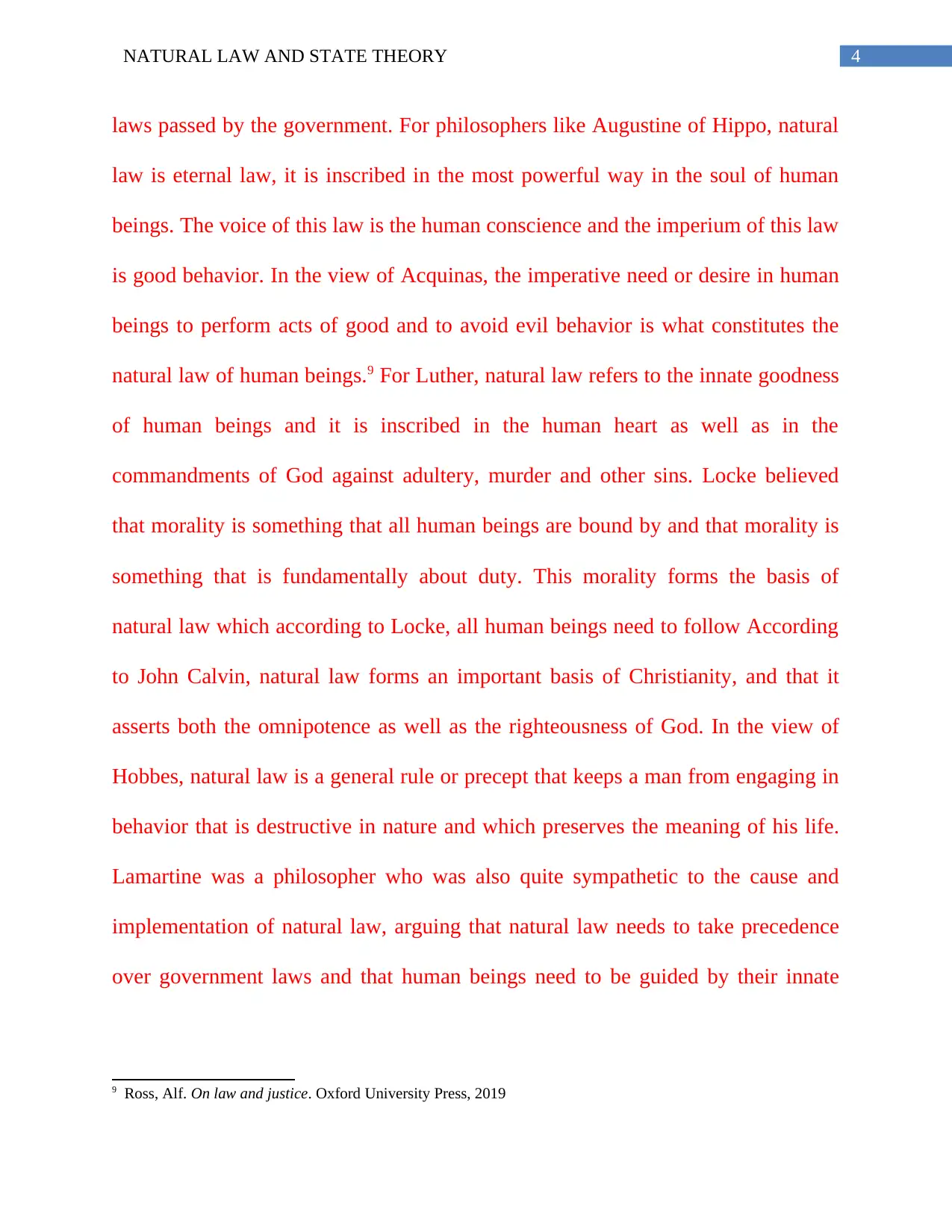
4NATURAL LAW AND STATE THEORY
laws passed by the government. For philosophers like Augustine of Hippo, natural
law is eternal law, it is inscribed in the most powerful way in the soul of human
beings. The voice of this law is the human conscience and the imperium of this law
is good behavior. In the view of Acquinas, the imperative need or desire in human
beings to perform acts of good and to avoid evil behavior is what constitutes the
natural law of human beings.9 For Luther, natural law refers to the innate goodness
of human beings and it is inscribed in the human heart as well as in the
commandments of God against adultery, murder and other sins. Locke believed
that morality is something that all human beings are bound by and that morality is
something that is fundamentally about duty. This morality forms the basis of
natural law which according to Locke, all human beings need to follow According
to John Calvin, natural law forms an important basis of Christianity, and that it
asserts both the omnipotence as well as the righteousness of God. In the view of
Hobbes, natural law is a general rule or precept that keeps a man from engaging in
behavior that is destructive in nature and which preserves the meaning of his life.
Lamartine was a philosopher who was also quite sympathetic to the cause and
implementation of natural law, arguing that natural law needs to take precedence
over government laws and that human beings need to be guided by their innate
9 Ross, Alf. On law and justice. Oxford University Press, 2019
laws passed by the government. For philosophers like Augustine of Hippo, natural
law is eternal law, it is inscribed in the most powerful way in the soul of human
beings. The voice of this law is the human conscience and the imperium of this law
is good behavior. In the view of Acquinas, the imperative need or desire in human
beings to perform acts of good and to avoid evil behavior is what constitutes the
natural law of human beings.9 For Luther, natural law refers to the innate goodness
of human beings and it is inscribed in the human heart as well as in the
commandments of God against adultery, murder and other sins. Locke believed
that morality is something that all human beings are bound by and that morality is
something that is fundamentally about duty. This morality forms the basis of
natural law which according to Locke, all human beings need to follow According
to John Calvin, natural law forms an important basis of Christianity, and that it
asserts both the omnipotence as well as the righteousness of God. In the view of
Hobbes, natural law is a general rule or precept that keeps a man from engaging in
behavior that is destructive in nature and which preserves the meaning of his life.
Lamartine was a philosopher who was also quite sympathetic to the cause and
implementation of natural law, arguing that natural law needs to take precedence
over government laws and that human beings need to be guided by their innate
9 Ross, Alf. On law and justice. Oxford University Press, 2019
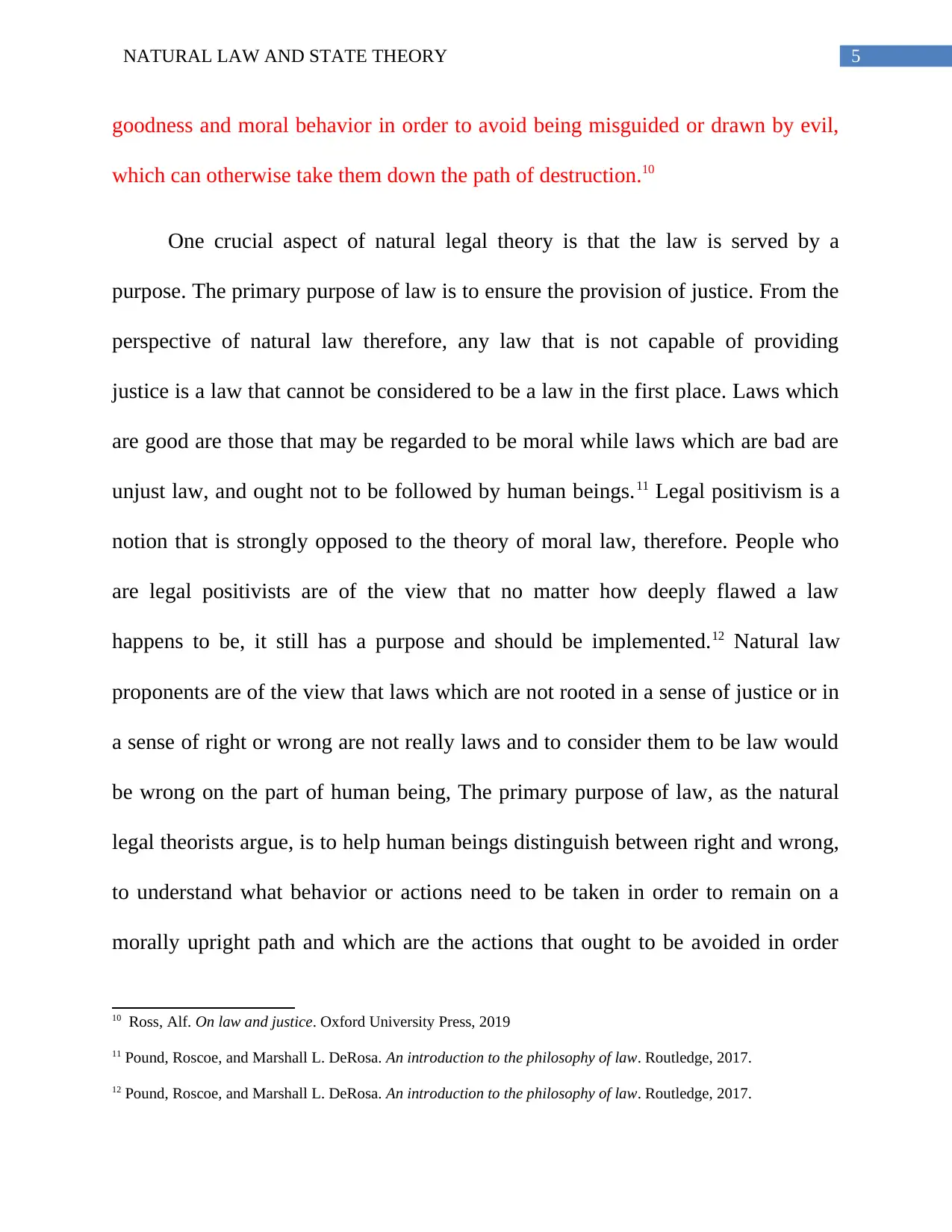
5NATURAL LAW AND STATE THEORY
goodness and moral behavior in order to avoid being misguided or drawn by evil,
which can otherwise take them down the path of destruction.10
One crucial aspect of natural legal theory is that the law is served by a
purpose. The primary purpose of law is to ensure the provision of justice. From the
perspective of natural law therefore, any law that is not capable of providing
justice is a law that cannot be considered to be a law in the first place. Laws which
are good are those that may be regarded to be moral while laws which are bad are
unjust law, and ought not to be followed by human beings.11 Legal positivism is a
notion that is strongly opposed to the theory of moral law, therefore. People who
are legal positivists are of the view that no matter how deeply flawed a law
happens to be, it still has a purpose and should be implemented.12 Natural law
proponents are of the view that laws which are not rooted in a sense of justice or in
a sense of right or wrong are not really laws and to consider them to be law would
be wrong on the part of human being, The primary purpose of law, as the natural
legal theorists argue, is to help human beings distinguish between right and wrong,
to understand what behavior or actions need to be taken in order to remain on a
morally upright path and which are the actions that ought to be avoided in order
10 Ross, Alf. On law and justice. Oxford University Press, 2019
11 Pound, Roscoe, and Marshall L. DeRosa. An introduction to the philosophy of law. Routledge, 2017.
12 Pound, Roscoe, and Marshall L. DeRosa. An introduction to the philosophy of law. Routledge, 2017.
goodness and moral behavior in order to avoid being misguided or drawn by evil,
which can otherwise take them down the path of destruction.10
One crucial aspect of natural legal theory is that the law is served by a
purpose. The primary purpose of law is to ensure the provision of justice. From the
perspective of natural law therefore, any law that is not capable of providing
justice is a law that cannot be considered to be a law in the first place. Laws which
are good are those that may be regarded to be moral while laws which are bad are
unjust law, and ought not to be followed by human beings.11 Legal positivism is a
notion that is strongly opposed to the theory of moral law, therefore. People who
are legal positivists are of the view that no matter how deeply flawed a law
happens to be, it still has a purpose and should be implemented.12 Natural law
proponents are of the view that laws which are not rooted in a sense of justice or in
a sense of right or wrong are not really laws and to consider them to be law would
be wrong on the part of human being, The primary purpose of law, as the natural
legal theorists argue, is to help human beings distinguish between right and wrong,
to understand what behavior or actions need to be taken in order to remain on a
morally upright path and which are the actions that ought to be avoided in order
10 Ross, Alf. On law and justice. Oxford University Press, 2019
11 Pound, Roscoe, and Marshall L. DeRosa. An introduction to the philosophy of law. Routledge, 2017.
12 Pound, Roscoe, and Marshall L. DeRosa. An introduction to the philosophy of law. Routledge, 2017.
⊘ This is a preview!⊘
Do you want full access?
Subscribe today to unlock all pages.

Trusted by 1+ million students worldwide
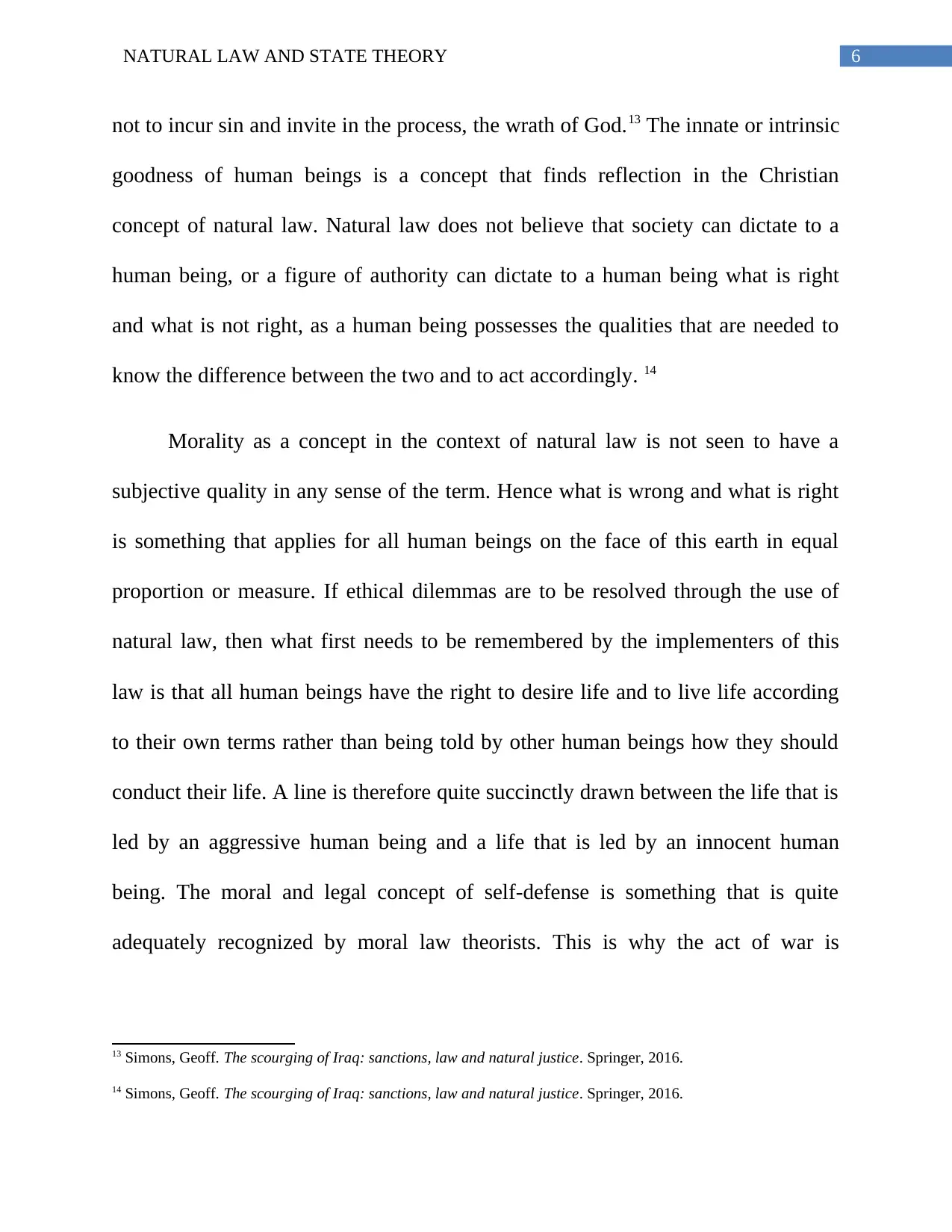
6NATURAL LAW AND STATE THEORY
not to incur sin and invite in the process, the wrath of God.13 The innate or intrinsic
goodness of human beings is a concept that finds reflection in the Christian
concept of natural law. Natural law does not believe that society can dictate to a
human being, or a figure of authority can dictate to a human being what is right
and what is not right, as a human being possesses the qualities that are needed to
know the difference between the two and to act accordingly. 14
Morality as a concept in the context of natural law is not seen to have a
subjective quality in any sense of the term. Hence what is wrong and what is right
is something that applies for all human beings on the face of this earth in equal
proportion or measure. If ethical dilemmas are to be resolved through the use of
natural law, then what first needs to be remembered by the implementers of this
law is that all human beings have the right to desire life and to live life according
to their own terms rather than being told by other human beings how they should
conduct their life. A line is therefore quite succinctly drawn between the life that is
led by an aggressive human being and a life that is led by an innocent human
being. The moral and legal concept of self-defense is something that is quite
adequately recognized by moral law theorists. This is why the act of war is
13 Simons, Geoff. The scourging of Iraq: sanctions, law and natural justice. Springer, 2016.
14 Simons, Geoff. The scourging of Iraq: sanctions, law and natural justice. Springer, 2016.
not to incur sin and invite in the process, the wrath of God.13 The innate or intrinsic
goodness of human beings is a concept that finds reflection in the Christian
concept of natural law. Natural law does not believe that society can dictate to a
human being, or a figure of authority can dictate to a human being what is right
and what is not right, as a human being possesses the qualities that are needed to
know the difference between the two and to act accordingly. 14
Morality as a concept in the context of natural law is not seen to have a
subjective quality in any sense of the term. Hence what is wrong and what is right
is something that applies for all human beings on the face of this earth in equal
proportion or measure. If ethical dilemmas are to be resolved through the use of
natural law, then what first needs to be remembered by the implementers of this
law is that all human beings have the right to desire life and to live life according
to their own terms rather than being told by other human beings how they should
conduct their life. A line is therefore quite succinctly drawn between the life that is
led by an aggressive human being and a life that is led by an innocent human
being. The moral and legal concept of self-defense is something that is quite
adequately recognized by moral law theorists. This is why the act of war is
13 Simons, Geoff. The scourging of Iraq: sanctions, law and natural justice. Springer, 2016.
14 Simons, Geoff. The scourging of Iraq: sanctions, law and natural justice. Springer, 2016.
Paraphrase This Document
Need a fresh take? Get an instant paraphrase of this document with our AI Paraphraser
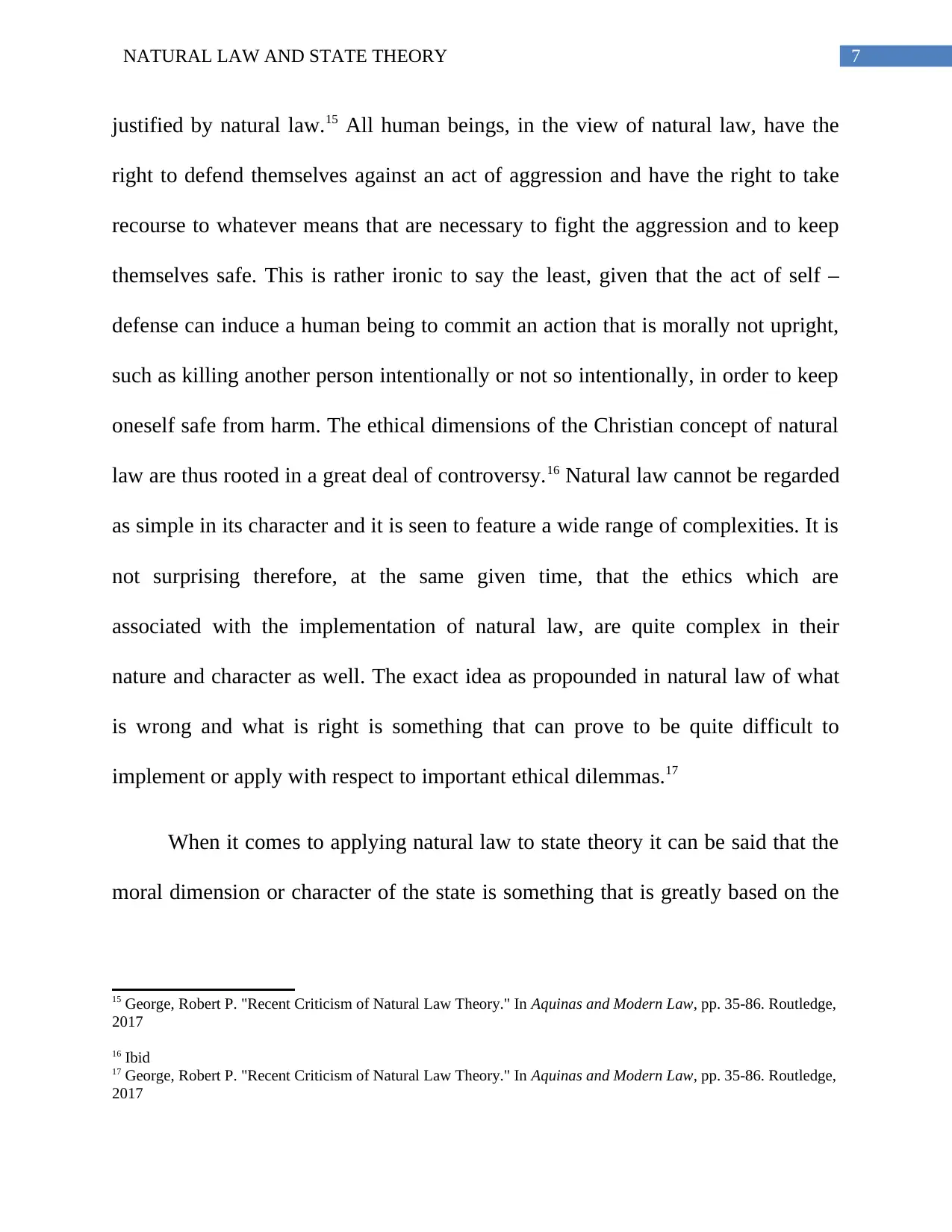
7NATURAL LAW AND STATE THEORY
justified by natural law.15 All human beings, in the view of natural law, have the
right to defend themselves against an act of aggression and have the right to take
recourse to whatever means that are necessary to fight the aggression and to keep
themselves safe. This is rather ironic to say the least, given that the act of self –
defense can induce a human being to commit an action that is morally not upright,
such as killing another person intentionally or not so intentionally, in order to keep
oneself safe from harm. The ethical dimensions of the Christian concept of natural
law are thus rooted in a great deal of controversy.16 Natural law cannot be regarded
as simple in its character and it is seen to feature a wide range of complexities. It is
not surprising therefore, at the same given time, that the ethics which are
associated with the implementation of natural law, are quite complex in their
nature and character as well. The exact idea as propounded in natural law of what
is wrong and what is right is something that can prove to be quite difficult to
implement or apply with respect to important ethical dilemmas.17
When it comes to applying natural law to state theory it can be said that the
moral dimension or character of the state is something that is greatly based on the
15 George, Robert P. "Recent Criticism of Natural Law Theory." In Aquinas and Modern Law, pp. 35-86. Routledge,
2017
16 Ibid
17 George, Robert P. "Recent Criticism of Natural Law Theory." In Aquinas and Modern Law, pp. 35-86. Routledge,
2017
justified by natural law.15 All human beings, in the view of natural law, have the
right to defend themselves against an act of aggression and have the right to take
recourse to whatever means that are necessary to fight the aggression and to keep
themselves safe. This is rather ironic to say the least, given that the act of self –
defense can induce a human being to commit an action that is morally not upright,
such as killing another person intentionally or not so intentionally, in order to keep
oneself safe from harm. The ethical dimensions of the Christian concept of natural
law are thus rooted in a great deal of controversy.16 Natural law cannot be regarded
as simple in its character and it is seen to feature a wide range of complexities. It is
not surprising therefore, at the same given time, that the ethics which are
associated with the implementation of natural law, are quite complex in their
nature and character as well. The exact idea as propounded in natural law of what
is wrong and what is right is something that can prove to be quite difficult to
implement or apply with respect to important ethical dilemmas.17
When it comes to applying natural law to state theory it can be said that the
moral dimension or character of the state is something that is greatly based on the
15 George, Robert P. "Recent Criticism of Natural Law Theory." In Aquinas and Modern Law, pp. 35-86. Routledge,
2017
16 Ibid
17 George, Robert P. "Recent Criticism of Natural Law Theory." In Aquinas and Modern Law, pp. 35-86. Routledge,
2017
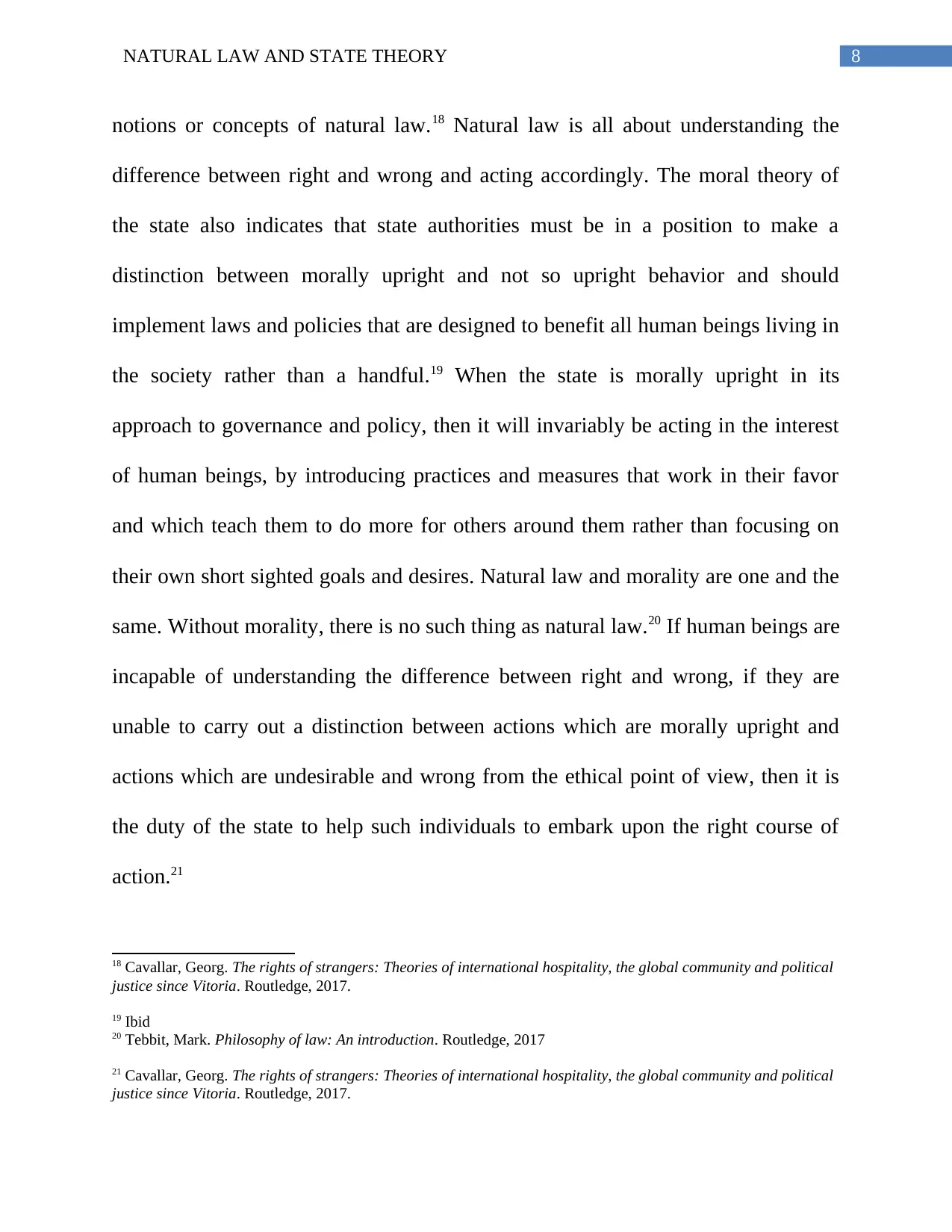
8NATURAL LAW AND STATE THEORY
notions or concepts of natural law.18 Natural law is all about understanding the
difference between right and wrong and acting accordingly. The moral theory of
the state also indicates that state authorities must be in a position to make a
distinction between morally upright and not so upright behavior and should
implement laws and policies that are designed to benefit all human beings living in
the society rather than a handful.19 When the state is morally upright in its
approach to governance and policy, then it will invariably be acting in the interest
of human beings, by introducing practices and measures that work in their favor
and which teach them to do more for others around them rather than focusing on
their own short sighted goals and desires. Natural law and morality are one and the
same. Without morality, there is no such thing as natural law.20 If human beings are
incapable of understanding the difference between right and wrong, if they are
unable to carry out a distinction between actions which are morally upright and
actions which are undesirable and wrong from the ethical point of view, then it is
the duty of the state to help such individuals to embark upon the right course of
action.21
18 Cavallar, Georg. The rights of strangers: Theories of international hospitality, the global community and political
justice since Vitoria. Routledge, 2017.
19 Ibid
20 Tebbit, Mark. Philosophy of law: An introduction. Routledge, 2017
21 Cavallar, Georg. The rights of strangers: Theories of international hospitality, the global community and political
justice since Vitoria. Routledge, 2017.
notions or concepts of natural law.18 Natural law is all about understanding the
difference between right and wrong and acting accordingly. The moral theory of
the state also indicates that state authorities must be in a position to make a
distinction between morally upright and not so upright behavior and should
implement laws and policies that are designed to benefit all human beings living in
the society rather than a handful.19 When the state is morally upright in its
approach to governance and policy, then it will invariably be acting in the interest
of human beings, by introducing practices and measures that work in their favor
and which teach them to do more for others around them rather than focusing on
their own short sighted goals and desires. Natural law and morality are one and the
same. Without morality, there is no such thing as natural law.20 If human beings are
incapable of understanding the difference between right and wrong, if they are
unable to carry out a distinction between actions which are morally upright and
actions which are undesirable and wrong from the ethical point of view, then it is
the duty of the state to help such individuals to embark upon the right course of
action.21
18 Cavallar, Georg. The rights of strangers: Theories of international hospitality, the global community and political
justice since Vitoria. Routledge, 2017.
19 Ibid
20 Tebbit, Mark. Philosophy of law: An introduction. Routledge, 2017
21 Cavallar, Georg. The rights of strangers: Theories of international hospitality, the global community and political
justice since Vitoria. Routledge, 2017.
⊘ This is a preview!⊘
Do you want full access?
Subscribe today to unlock all pages.

Trusted by 1+ million students worldwide
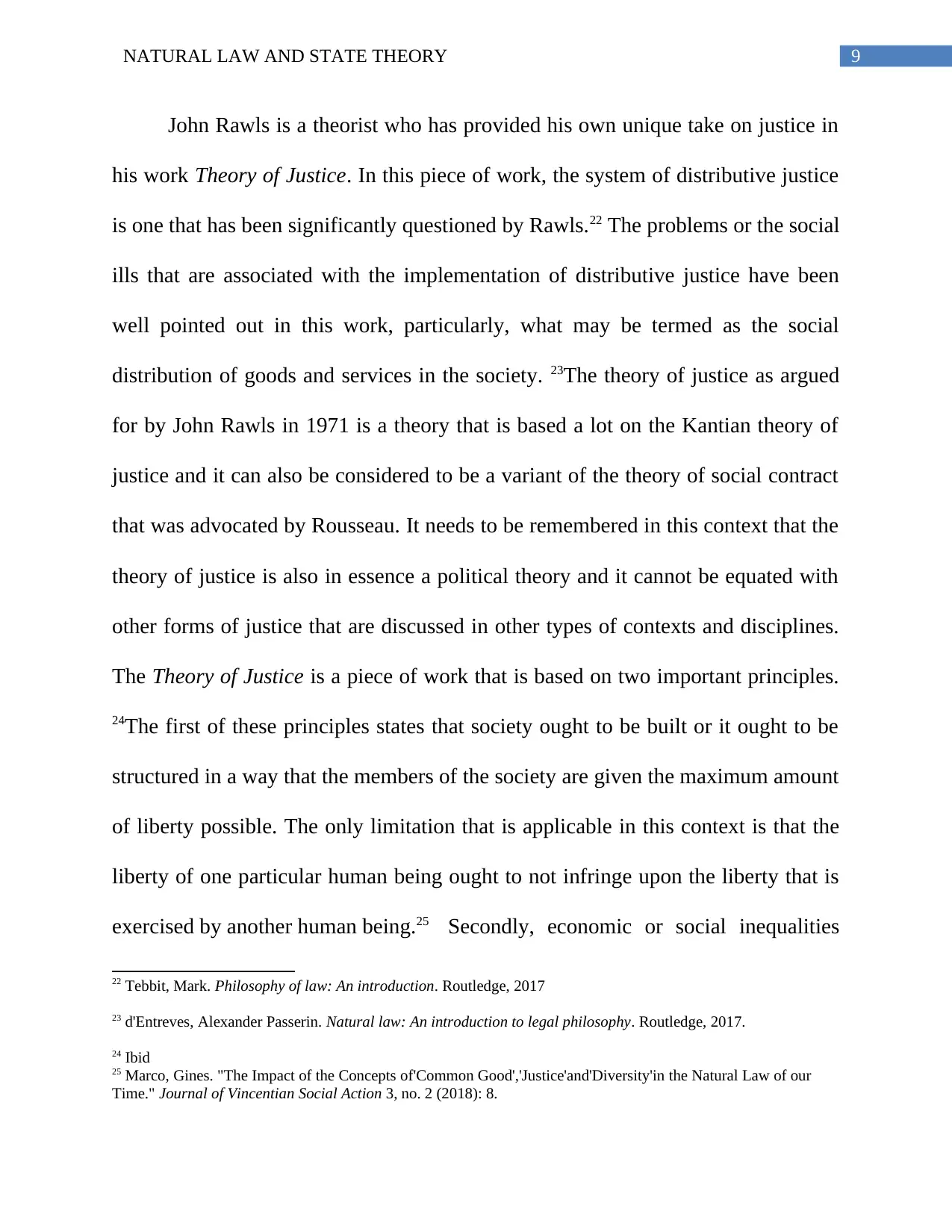
9NATURAL LAW AND STATE THEORY
John Rawls is a theorist who has provided his own unique take on justice in
his work Theory of Justice. In this piece of work, the system of distributive justice
is one that has been significantly questioned by Rawls.22 The problems or the social
ills that are associated with the implementation of distributive justice have been
well pointed out in this work, particularly, what may be termed as the social
distribution of goods and services in the society. 23The theory of justice as argued
for by John Rawls in 1971 is a theory that is based a lot on the Kantian theory of
justice and it can also be considered to be a variant of the theory of social contract
that was advocated by Rousseau. It needs to be remembered in this context that the
theory of justice is also in essence a political theory and it cannot be equated with
other forms of justice that are discussed in other types of contexts and disciplines.
The Theory of Justice is a piece of work that is based on two important principles.
24The first of these principles states that society ought to be built or it ought to be
structured in a way that the members of the society are given the maximum amount
of liberty possible. The only limitation that is applicable in this context is that the
liberty of one particular human being ought to not infringe upon the liberty that is
exercised by another human being.25 Secondly, economic or social inequalities
22 Tebbit, Mark. Philosophy of law: An introduction. Routledge, 2017
23 d'Entreves, Alexander Passerin. Natural law: An introduction to legal philosophy. Routledge, 2017.
24 Ibid
25 Marco, Gines. "The Impact of the Concepts of'Common Good','Justice'and'Diversity'in the Natural Law of our
Time." Journal of Vincentian Social Action 3, no. 2 (2018): 8.
John Rawls is a theorist who has provided his own unique take on justice in
his work Theory of Justice. In this piece of work, the system of distributive justice
is one that has been significantly questioned by Rawls.22 The problems or the social
ills that are associated with the implementation of distributive justice have been
well pointed out in this work, particularly, what may be termed as the social
distribution of goods and services in the society. 23The theory of justice as argued
for by John Rawls in 1971 is a theory that is based a lot on the Kantian theory of
justice and it can also be considered to be a variant of the theory of social contract
that was advocated by Rousseau. It needs to be remembered in this context that the
theory of justice is also in essence a political theory and it cannot be equated with
other forms of justice that are discussed in other types of contexts and disciplines.
The Theory of Justice is a piece of work that is based on two important principles.
24The first of these principles states that society ought to be built or it ought to be
structured in a way that the members of the society are given the maximum amount
of liberty possible. The only limitation that is applicable in this context is that the
liberty of one particular human being ought to not infringe upon the liberty that is
exercised by another human being.25 Secondly, economic or social inequalities
22 Tebbit, Mark. Philosophy of law: An introduction. Routledge, 2017
23 d'Entreves, Alexander Passerin. Natural law: An introduction to legal philosophy. Routledge, 2017.
24 Ibid
25 Marco, Gines. "The Impact of the Concepts of'Common Good','Justice'and'Diversity'in the Natural Law of our
Time." Journal of Vincentian Social Action 3, no. 2 (2018): 8.
Paraphrase This Document
Need a fresh take? Get an instant paraphrase of this document with our AI Paraphraser
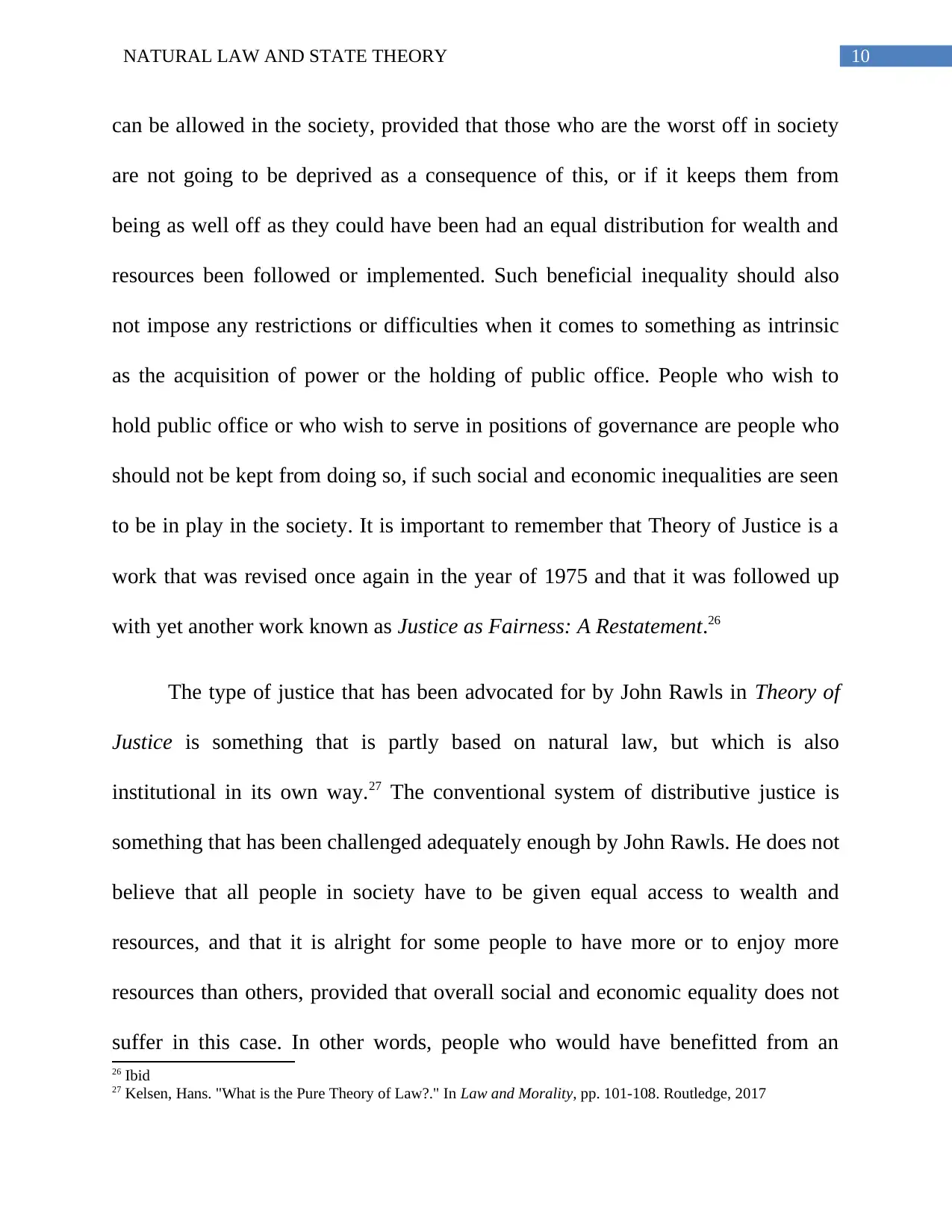
10NATURAL LAW AND STATE THEORY
can be allowed in the society, provided that those who are the worst off in society
are not going to be deprived as a consequence of this, or if it keeps them from
being as well off as they could have been had an equal distribution for wealth and
resources been followed or implemented. Such beneficial inequality should also
not impose any restrictions or difficulties when it comes to something as intrinsic
as the acquisition of power or the holding of public office. People who wish to
hold public office or who wish to serve in positions of governance are people who
should not be kept from doing so, if such social and economic inequalities are seen
to be in play in the society. It is important to remember that Theory of Justice is a
work that was revised once again in the year of 1975 and that it was followed up
with yet another work known as Justice as Fairness: A Restatement.26
The type of justice that has been advocated for by John Rawls in Theory of
Justice is something that is partly based on natural law, but which is also
institutional in its own way.27 The conventional system of distributive justice is
something that has been challenged adequately enough by John Rawls. He does not
believe that all people in society have to be given equal access to wealth and
resources, and that it is alright for some people to have more or to enjoy more
resources than others, provided that overall social and economic equality does not
suffer in this case. In other words, people who would have benefitted from an
26 Ibid
27 Kelsen, Hans. "What is the Pure Theory of Law?." In Law and Morality, pp. 101-108. Routledge, 2017
can be allowed in the society, provided that those who are the worst off in society
are not going to be deprived as a consequence of this, or if it keeps them from
being as well off as they could have been had an equal distribution for wealth and
resources been followed or implemented. Such beneficial inequality should also
not impose any restrictions or difficulties when it comes to something as intrinsic
as the acquisition of power or the holding of public office. People who wish to
hold public office or who wish to serve in positions of governance are people who
should not be kept from doing so, if such social and economic inequalities are seen
to be in play in the society. It is important to remember that Theory of Justice is a
work that was revised once again in the year of 1975 and that it was followed up
with yet another work known as Justice as Fairness: A Restatement.26
The type of justice that has been advocated for by John Rawls in Theory of
Justice is something that is partly based on natural law, but which is also
institutional in its own way.27 The conventional system of distributive justice is
something that has been challenged adequately enough by John Rawls. He does not
believe that all people in society have to be given equal access to wealth and
resources, and that it is alright for some people to have more or to enjoy more
resources than others, provided that overall social and economic equality does not
suffer in this case. In other words, people who would have benefitted from an
26 Ibid
27 Kelsen, Hans. "What is the Pure Theory of Law?." In Law and Morality, pp. 101-108. Routledge, 2017
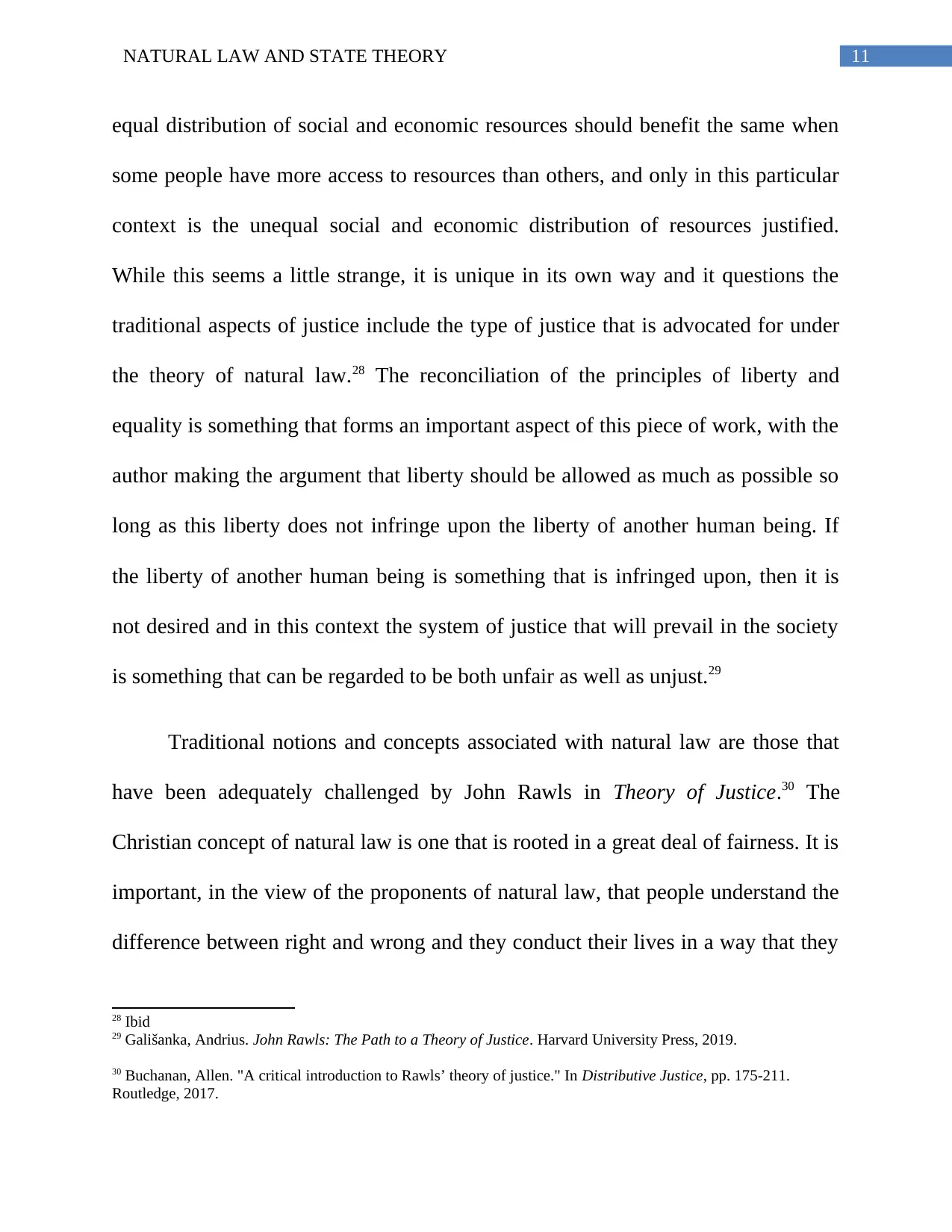
11NATURAL LAW AND STATE THEORY
equal distribution of social and economic resources should benefit the same when
some people have more access to resources than others, and only in this particular
context is the unequal social and economic distribution of resources justified.
While this seems a little strange, it is unique in its own way and it questions the
traditional aspects of justice include the type of justice that is advocated for under
the theory of natural law.28 The reconciliation of the principles of liberty and
equality is something that forms an important aspect of this piece of work, with the
author making the argument that liberty should be allowed as much as possible so
long as this liberty does not infringe upon the liberty of another human being. If
the liberty of another human being is something that is infringed upon, then it is
not desired and in this context the system of justice that will prevail in the society
is something that can be regarded to be both unfair as well as unjust.29
Traditional notions and concepts associated with natural law are those that
have been adequately challenged by John Rawls in Theory of Justice.30 The
Christian concept of natural law is one that is rooted in a great deal of fairness. It is
important, in the view of the proponents of natural law, that people understand the
difference between right and wrong and they conduct their lives in a way that they
28 Ibid
29 Gališanka, Andrius. John Rawls: The Path to a Theory of Justice. Harvard University Press, 2019.
30 Buchanan, Allen. "A critical introduction to Rawls’ theory of justice." In Distributive Justice, pp. 175-211.
Routledge, 2017.
equal distribution of social and economic resources should benefit the same when
some people have more access to resources than others, and only in this particular
context is the unequal social and economic distribution of resources justified.
While this seems a little strange, it is unique in its own way and it questions the
traditional aspects of justice include the type of justice that is advocated for under
the theory of natural law.28 The reconciliation of the principles of liberty and
equality is something that forms an important aspect of this piece of work, with the
author making the argument that liberty should be allowed as much as possible so
long as this liberty does not infringe upon the liberty of another human being. If
the liberty of another human being is something that is infringed upon, then it is
not desired and in this context the system of justice that will prevail in the society
is something that can be regarded to be both unfair as well as unjust.29
Traditional notions and concepts associated with natural law are those that
have been adequately challenged by John Rawls in Theory of Justice.30 The
Christian concept of natural law is one that is rooted in a great deal of fairness. It is
important, in the view of the proponents of natural law, that people understand the
difference between right and wrong and they conduct their lives in a way that they
28 Ibid
29 Gališanka, Andrius. John Rawls: The Path to a Theory of Justice. Harvard University Press, 2019.
30 Buchanan, Allen. "A critical introduction to Rawls’ theory of justice." In Distributive Justice, pp. 175-211.
Routledge, 2017.
⊘ This is a preview!⊘
Do you want full access?
Subscribe today to unlock all pages.

Trusted by 1+ million students worldwide
1 out of 26
Related Documents
Your All-in-One AI-Powered Toolkit for Academic Success.
+13062052269
info@desklib.com
Available 24*7 on WhatsApp / Email
![[object Object]](/_next/static/media/star-bottom.7253800d.svg)
Unlock your academic potential
Copyright © 2020–2026 A2Z Services. All Rights Reserved. Developed and managed by ZUCOL.





